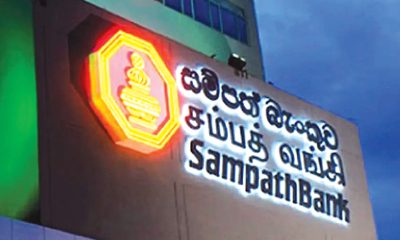Business
Sampath Bank completes 20th restoration under ‘Wewata Jeewayak’ by rejuvenating Kidachchoori Tank in Vavuniya, handing over to the community on Thai Pongal Day
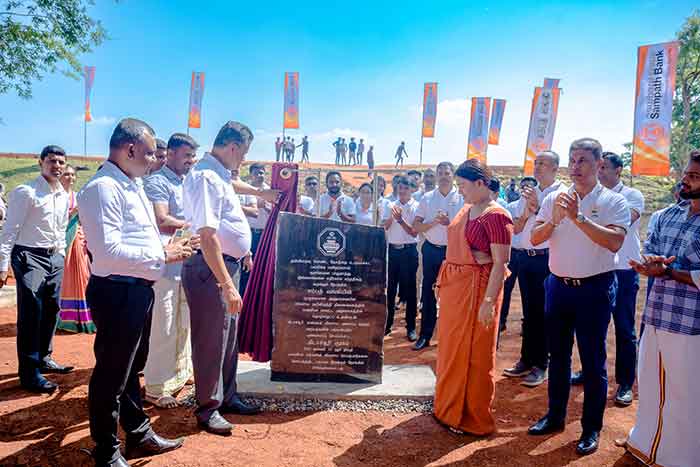
Sampath Bank completes 20th restoration under ‘Wewata Jeewayak’ by rejuvenating Kidachchoori Tank in Vavuniya, handing over to the community on Thai Pongal Day Sampath Bank stepped forward to provide much-needed support to the farmers of the Northern region who are battling intense heat and unforgiving soil by successfully restoring and gifting the Vavuniya Kidachchoori Tank to the people of the region under its award-winning Corporate Sustainability Responsibility initiative, ‘Wewata Jeewayak’. Sampath Bank Managing Director Ayodhya Iddawela Perera, Senior Deputy General Manager – Marketing & Customer Care Tharaka Ranwala, Chief Human Resource Officer Dr. Lalith Weragoda, Development Commissioner General Agrarian Development A.H.M.L. Aberathna, government officials, Kannagi Farmers’ Association officers and members as well as a large number of local residents were present at the occasion.
Farmers of the North struggle to cultivate their lands due to minimum resources but make a significant contribution to the nation’s economy by providing essential food items such as chillies, onions, and potatoes, thereby helping to strengthen the agro economy of the nation. Amidst such a backdrop where they are faced with numerous hardships on multiple fronts, these Northern farmers also harvest hundreds of acres of paddy to supply a significant amount of rice to the nation. Having understood the vital role played by these Northern farmers, Sampath Bank took the necessary steps to commence the restoration of the Vavuniya Kidachchoori Tank as part of ‘Wewata Jeewayak’, making the initiative the first irrigation project of the Northern Province and the 20th overall across the island.
Although the farmers of the region made numerous futile attempts while being faced with an ever-increasing need for a steady supply of water to cultivate their lands during both the Yala and Maha seasons they were left with limited options to cultivate their large land area. Having eventually grown accustomed to surviving on a single harvest season, through their Farmers’ Association they approached several organisations in the hope of receiving support to restore the tank and subsequently connected with Sampath Bank’s ‘Wewata Jeewayak’ program to meet their objectives. Accordingly, Sampath Bank took on the project under the ‘Wewata Jeewayak’ program to restore the Vavuniya Echankulam Kidachchoori Tank with the aim of ensuring a better future for farmers and their families while also rejuvenating dying traditional irrigation systems.
While 290 farming families occupying 185 acres of land are direct beneficiaries of the Kidachchoori Tank, the dilapidated state of the tank in recent years has greatly hampered their farming activities. The tank’s two sluices were not functioning well and water was wasted due to significant leaks in both sluice gates. The daily water leak was similar to amount of water sufficient for cultivating 5 acres of paddy lands. Further, the tank was not sufficiently filled with water due to the damaged feeder canal which was previously connected to a cascaded irrigation system.
Sampath Bank stepped forward to restore the tank and transform it into a complete irrigation system giving hope to the Vavuniya Echankulam farming community. Within a short period of time, the bank was able to successfully restore the entire irrigation system by overhauling the two sluice gates to stop any water leaks, restoring the feeder canal and attending to any other restoration work necessary. The bank was provided technical assistance during the project by the Vavuniya District Department of Agrarian Development.
Sharing her thoughts during the Thai Pongal celebration at Vavuniya Echankulam, Sampath Bank Managing Director Ayodhya Iddawela Perera stated, “I am happy to announce the 20th successful tank restoration in Sri Lanka under our ‘Wewata Jeewayak’ Corporate Sustainability Responsibility initiative carried out at the Vavuniya Kidachchoori Tank. The accelerated restoration effort has delivered a complete irrigation system to the hardworking farming community of the Northern Province. Now they can move forward and cultivate and harvest their paddy fields during both seasons.
We believe that this is wonderful news not only for them but the entire nation as well. Sampath Bank will continue to make all possible efforts to contribute towards uplifting the economy of the farming communities of Sri Lanka. In closing, I would like to convey our gratitude to all those who have contributed in various ways to make this project a tremendous success including the Department of Agrarian Development and other government bodies, officials, Kannagi Farmers’ Association and residents of the area.”
Business
CEB urged to revise Draft Long Term Generation Expansion Plan, in view of renewable energy needs

By Ifham Nizam
The Public Utilities Commission of Sri Lanka (PUCSL) has instructed the Ceylon Electricity Board (CEB) to revise its Draft Long-Term Generation Expansion Plan (LTGEP) 2025-2044, incorporating more robust projections for renewable energy and battery storage, while also reassessing LNG infrastructure and procurement strategies.
The Island Financial Review reliably learns PUCSL Director General Damitha Kumarasinghe emphasized the need for “more robust and realistic cost assumptions for Renewable Technologies and Battery Energy Storage Systems (BESS).”
The Commission stressed that BESS should be valued not just as a renewable integration tool but also for its potential to mitigate power shortages.
The directive also calls for revisions in LNG infrastructure planning, including “a comprehensive analysis covering LNG fuel cost calculation, infrastructure development, procurement contracting options, and risks associated with supply and procurement.” PUCSL has specifically highlighted the importance of evaluating the financial and economic feasibility of a natural gas pipeline from Kerawalapitiya to Kelanitissa.
Kanchana Siriwardena, Deputy Director General – Industry Services, reinforced the Commission’s stance on renewable energy, stating that “further reductions in renewable energy curtailment should be explored by incorporating more BESS.”
The PUCSL’s instructions also mandate incorporating clauses from the Memorandum of Understanding (MoU) with Petronet India, which includes a temporary LNG supply for the Sobadhanavi Plant. The revised LTGEP must also factor in infrastructure costs related to the Floating Storage Regasification Unit (FSRU) and pipeline networks as part of the overall LNG cost calculation.
The CEB is expected to resubmit the revised plan for PUCSL’s approval, ensuring alignment with Sri Lanka’s long-term energy security and sustainability goals.
The PUCSL directive also calls for a comprehensive evaluation of various LNG procurement options and associated risks. These include:
LNG infrastructure development and expansion
Contracting options for LNG procurement
Risks related to LNG supply and procurement stability
Robustness of natural gas demand calculations
Economic feasibility of the proposed natural gas pipeline from Kerawalapitiya to Kelanitissa, given the low plant factors of power stations at Kelanitissa.
Business
Nations Trust Bank ends 2024 with strong performance, achieving 24% ROE
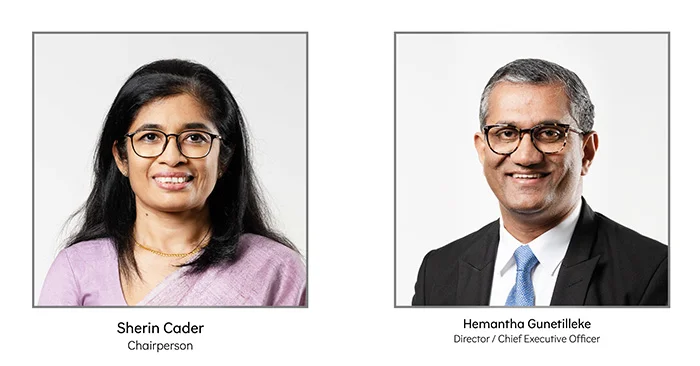
Nations Trust Bank PLC reported strong financial results for the twelve months ending 31st December 2024, achieving a Profit After Tax (PAT) of LKR 17 Bn, up 46% YoY.
Nations Trust Bank, Director & Chief Executive Officer, Hemantha Gunetilleke, stated, “The Bank’s performance for the twelve months ending 31st December 2024 showcases our continued growth and expansion across diverse customer segments. Our solid capital position, strong liquidity buffers, effective risk management frameworks, and steadfast commitment to service excellence and digital empowerment remain the key drivers of our success.”
Improvements in the macro-economic environment and successful management of the Bank’s credit portfolio resulted in total impairment charges decreasing by 69% and the Net Stage 3 ratio reducing to 1.6%.
The Bank’s financial performance is supported by its strong capital buffers, with Tier I Capital at 21.47% and a Total Capital Adequacy Ratio of 22.66%, well above the regulatory requirements of 8.5% and 12.5%, respectively.
A strong liquidity buffer was maintained with a Liquidity Coverage Ratio of 320.56% against the regulatory requirement of 100%.
The Bank reported a Return on Equity (ROE) of 24.22%, while its Earnings Per Share for the twelve months ending 31st December 2024 increased to LKR 50.82, against LKR 34.70 recorded during the same period last year.
Nations Trust Bank PLC serves a diverse range of customers across Consumer, Commercial and Corporate segments through multi-channel customer touch points spanning both physical and digital. The Bank is focused on digital empowerment through cutting-edge digital banking technologies, and pioneered FriMi, Sri Lanka’s leading digital banking experience. Nations Trust Bank PLC is an issuer and sole acquirer of American Express Cards in Sri Lanka with market leadership in the premium segments.
Business
Modern Challenges and Opportunities for the Apparel Industry: JAAF drives industry dialogue
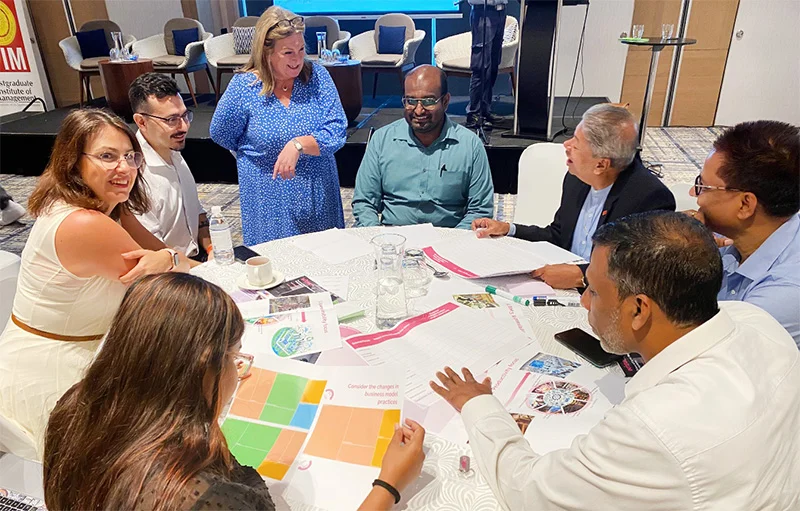
The Joint Apparel Association Forum (JAAF), in collaboration with Monash Business School and the Postgraduate Institute of Management (PIM) successfully hosted the International Conference on the Apparel Industry 2025 recently in Colombo. This was the second time the event was held, following its inaugural edition in 2018, as part of JAAF’s commitment to fostering dialogue and collaboration within the global apparel sector.
Themed “Modern Challenges and Opportunities for the Apparel Industry”, the three-day event brought together industry leaders, academics, and sustainability experts to discuss pressing issues such as ESG (Environmental, Social, and Governance) compliance, circular economy strategies, technological advancements, and workforce transformation.
A key highlight of the event was the panel discussion on “Current Actions and Their Impact on ESG-Related Outcomes in the Apparel Industry,” featuring:
Felix A. Fernando – CEO, Omega Line Ltd.
Nemanthie Kooragamage – Director Group Sustainable Business, MAS Holdings
Gayan Ranasinghe – Control Union,
Chamindry Saparamadu – Director General/CEO, Sustainable Development Council
Pyumi Sumanasekara – Principal Partner, KPMG Sri Lanka
Discussions emphasized how Sri Lanka’s apparel industry is adapting to global ESG standards, incorporating sustainable production methods, and aligning with evolving regulatory frameworks.
-

 Business3 days ago
Business3 days agoSri Lanka’s 1st Culinary Studio opened by The Hungryislander
-

 Sports4 days ago
Sports4 days agoHow Sri Lanka fumbled their Champions Trophy spot
-
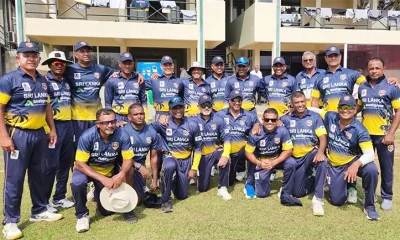
 Sports7 days ago
Sports7 days agoSri Lanka face Australia in Masters World Cup semi-final today
-

 News7 days ago
News7 days agoCourtroom shooting: Police admit serious security lapses
-

 News7 days ago
News7 days agoUnderworld figure ‘Middeniye Kajja’ and daughter shot dead in contract killing
-

 News6 days ago
News6 days agoKiller made three overseas calls while fleeing
-

 News5 days ago
News5 days agoSC notices Power Minister and several others over FR petition alleging govt. set to incur loss exceeding Rs 3bn due to irregular tender
-

 Features4 days ago
Features4 days agoThe Murder of a Journalist



